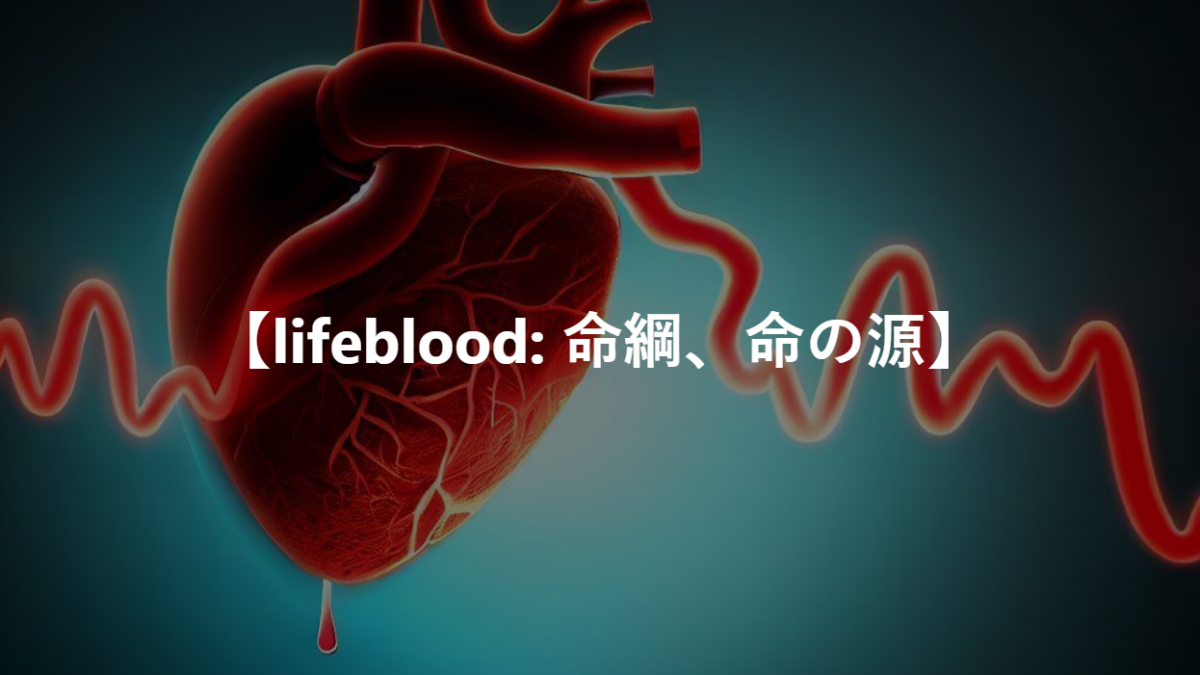語源・類義語・反対語・例文
【lifeblood: 命綱、命の源】という単語の語源とか由来を知っていますか?
「Lifeblood」(命綱、命の源)は、「life」(命)と「blood」(血)の二つの単語が合わさって形成された合成語です。この表現は直接的には、血が生命維持に不可欠であることを指し示しています。血は人間や動物の体内を循環し、酸素、栄養素を運び、老廃物を除去することで、生命を維持する上で中心的な役割を果たしています。
文学的、比喩的な意味で、「lifeblood」はあるものが生存や繁栄、成功のために絶対に必要な要素や資源を指すために使われるようになりました。この用法では、ある組織、コミュニティ、プロジェクト、あるいはアイデアの存続や健康を維持するのに不可欠なものという意味で使用されます。
語源的には、英語で「life」は生命を、「blood」は血を意味し、これらの基本的な要素から「lifeblood」の概念が生まれ、何かが生き続けるために極めて重要であることを表現しています。この言葉は時間とともに発展し、比喩的な使用が一般的になりました。
“Lifeblood” is a compound word formed from the two words “life” and “blood.” This expression directly signifies the essential role of blood in maintaining life. Blood circulates within the bodies of humans and animals, transporting oxygen and nutrients, and removing waste, thus playing a central role in sustaining life.
In a literary and metaphorical sense, “lifeblood” has come to denote an absolutely necessary element or resource for survival, prosperity, or success. In this usage, it refers to something indispensable for the continuance or health of an organization, community, project, or idea.
Etymologically, “life” means life and “blood” means blood in English, and from these fundamental components, the concept of “lifeblood” emerged, symbolizing something that is extremely important for continued existence. Over time, the term has evolved, and its metaphorical use has become widespread.
この単語の類義語・反対語を教えてください。
類義語
- Essence: 本質、最も重要な特質や要素。
- Backbone: 支柱、何かを支える主要な力。
- Foundation: 基礎、何かが成り立つ根本的な土台。
- Cornerstone: 基石、重要な要素や原則。
- Linchpin: 要、物事を一緒に保つ不可欠な要素。
反対語
- Triviality: ささいなこと、重要でない事柄。
- Insignificance: 無意味、重要性がないこと。
- Superfluity: 過剰、必要以上のもの。
- Nonessential: 非本質的、必須でないもの。
- Periphery: 周辺部、中心や本質から離れた部分。
この単語を使った例文
“Tourism is the lifeblood of the local economy, providing income and jobs to many residents.”
観光は地元経済の命綱であり、多くの住民に収入と仕事を提供しています。
“Innovative ideas are the lifeblood of our tech company, keeping us ahead of the competition.”
革新的なアイデアは私たちの技術会社の命綱であり、私たちを競合よりも先に進ませています。
“Regular donations are the lifeblood of our charity, allowing us to continue our humanitarian work.”
定期的な寄付は私たちの慈善団体の命綱であり、私たちが人道的な活動を続けることを可能にします。
“Water is the lifeblood of agriculture, essential for growing crops and sustaining livestock.”
水は農業の命綱であり、作物の栽培や家畜の維持に不可欠です。
“Trust is the lifeblood of any relationship, without which it cannot thrive.”
信頼はどんな関係の命綱であり、それがなければ関係は繁栄できません。
【lifeblood: 命綱、命の源】のコロケーション
- lifeblood of the economy: 経済の命綱
- lifeblood of the community: コミュニティの生命線
- lifeblood of the organization: 組織の命の源
- lifeblood of the industry: 産業の生命線
- lifeblood of the ecosystem: 生態系の命綱
- lifeblood of innovation: 革新の命の源
- lifeblood of culture: 文化の生命線
- lifeblood of growth: 成長の生命線
- lifeblood of the system: システムの命綱
- lifeblood of the project: プロジェクトの生命線
人間と自然の相互作用の複雑なタペストリーの中で、「lifeblood of the economy」は、存在のさまざまな側面を支え、育てるために不可欠で、重要な要素を象徴する、感動的な意味を持ちます。
「lifeblood of the economy」とは、経済活動と繁栄を維持するために不可欠な要因や資源を指します。これには、天然資源、労働力、またはイノベーションが含まれ、それぞれが経済構造の富と安定性の礎となっています。
「lifeblood of the community」について話すとき、私たちは人々を結びつける社会的および文化的な土台に目を向けます。これには、共有された価値観、伝統、またはコミュニティの社会的健康と団結に不可欠な共同支援システムが含まれるかもしれません。
「lifeblood of the organization」は、組織が繁栄し続けるための核となる要素を指します。これには、その従業員、核となる価値、または競争の激しい風景の中での生存と成功を保証する独自の戦略が含まれるかもしれません。
「lifeblood of the industry」に目を向けると、特定の部門の持続性と進化のために不可欠な、革新、熟練労働、または原材料などの重要な要素を特定します。
自然の領域では、「lifeblood of the ecosystem」は、生物共同体のバランスと健康を維持するために重要な構成要素やプロセス、例えば水や一次生産者を意味します。これは、生物多様性と生態系の安定性を保証します。
「lifeblood of innovation」は、創造性と進歩を促進するために不可欠な要素を強調します。これには、実験の文化、資金、または進歩と新奇性のエンジンを駆動する知的自由が含まれるかもしれません。
文化の領域では、「lifeblood of culture」は、社会の文化的アイデンティティと遺産を維持し、豊かにする伝統、物語、表現を体現しており、過去と未来の間の橋渡しとして機能します。
成長について話すと、「lifeblood of growth」は、個人の成長、ビジネスの拡張、または国の進歩など、発展に不可欠な要因を包含します。これには、教育、投資、またはリーダーシップが含まれるかもしれません。
「lifeblood of the system」は、技術的、生態的、または社会的構造など、システムの効果的な運用と安定性を保証する重要な構成要素を指します。
最後に、「lifeblood of the project」は、プロジェクトの目標の成功した完了と達成に必要な基本的な要素や資源を指します。これには、計画、チームワーク、およびリソースが含まれるかもしれません。
本質的に、「命の源」という比喩は、さまざまな領域の基本的で生命を維持する要素を美しく表現し、それらが不可欠であることと、私たちの集団的および個々の努力を育て、維持し、進歩させる上で果たす重要な役割を強調しています。
In the complex tapestry of human and natural interactions, the term “lifeblood” holds a poignant significance, symbolizing the essential, vital elements that sustain and nurture various facets of existence.
The “lifeblood of the economy” refers to the indispensable factors or resources that fuel economic activity and prosperity. These could be natural resources, workforce, or innovation, each acting as a cornerstone upon which the wealth and stability of an economic structure are built.
When we speak of the “lifeblood of the community,” we delve into the social and cultural underpinnings that bind people together. This could encompass shared values, traditions, or communal support systems that are crucial for the social health and unity of a community.
The “lifeblood of the organization” points to the core elements that keep an organization thriving. This may include its employees, core values, or unique strategies that ensure its survival and success in a competitive landscape.
Turning our gaze to the “lifeblood of the industry,” we identify the key components, such as innovation, skilled labor, or raw materials, that are essential for the sustenance and evolution of specific sectors.
In the realm of nature, the “lifeblood of the ecosystem” signifies the critical components or processes, like water or primary producers, that maintain the balance and health of biological communities, ensuring biodiversity and ecological stability.
The “lifeblood of innovation” highlights the elements indispensable for fostering creativity and advancement. This could be a culture of experimentation, funding, or intellectual freedom that drives the engine of progress and novelty.
In the sphere of culture, the “lifeblood” embodies the traditions, stories, and expressions that maintain and enrich the cultural identity and heritage of a society, acting as a bridge between the past and the future.
Talking about growth, the “lifeblood of growth” encapsulates the factors crucial for development, be it personal growth, business expansion, or the advancement of a nation, such as education, investment, or leadership.
The “lifeblood of the system” refers to the vital components that ensure the effective operation and stability of a system, whether it be a technological, ecological, or social structure.
Lastly, the “lifeblood of the project” alludes to the essential elements or resources required for the successful completion and achievement of a project’s goals, encompassing planning, teamwork, and resources.
In essence, the metaphor of lifeblood beautifully encapsulates the fundamental, life-sustaining elements in various domains, underlining their indispensable nature and the critical role they play in nurturing, maintaining, and advancing our collective and individual endeavors.
練習問題
文法問題
問題1
Choose the correct word to complete the sentence.
“Water is the __ of all living organisms.”
(A) lifeblood
(B) lifeboat
(C) lifeguard
(D) lifeline
解答1
(A) lifeblood
解説1
この文では「水はすべての生物の命の源です」という意味です。”lifeblood” は「命の源」という意味で、文脈に最も適しています。他の選択肢も関連していますが、文脈に最も合うのは “lifeblood” です。
問題2
Fill in the blank with the correct word.
“Electricity is considered the __ of modern society.”
(A) lifeblood
(B) lifeboat
(C) lifejacket
(D) lifeline
解答2
(A) lifeblood
解説2
この文では「電気は現代社会の命綱と考えられています」という意味です。”lifeblood” は「命の源」という意味で、文脈に最も適しています。他の選択肢も関連していますが、文脈に最も合うのは “lifeblood” です。
問題3
Select the best option to complete the sentence.
“Small businesses are the __ of the local economy.”
(A) lifeblood
(B) lifeboat
(C) lifeguard
(D) lifeline
解答3
(A) lifeblood
解説3
この文では「小規模事業は地域経済の命綱です」という意味です。”lifeblood” は「命の源」という意味で、文脈に最も適しています。他の選択肢も関連していますが、文脈に最も合うのは “lifeblood” です。
問題4
Complete the sentence with the appropriate word.
“Tourism is the __ of this coastal town.”
(A) lifeblood
(B) lifeboat
(C) lifeline
(D) lifeguard
解答4
(A) lifeblood
解説4
この文では「観光業はこの沿岸町の命の源です」という意味です。”lifeblood” は「命の源」という意味で、文脈に最も適しています。他の選択肢も関連していますが、文脈に最も合うのは “lifeblood” です。
問題5
Choose the correct option to complete the sentence.
“Access to fresh water is the __ of rural communities.”
(A) lifeblood
(B) lifeboat
(C) lifeline
(D) lifeguard
解答5
(A) lifeblood
解説5
この文では「新鮮な水へのアクセスは農村コミュニティの命の源です」という意味です。”lifeblood” は「命の源」という意味で、文脈に最も適しています。他の選択肢も関連していますが、文脈に最も合うのは “lifeblood” です。

